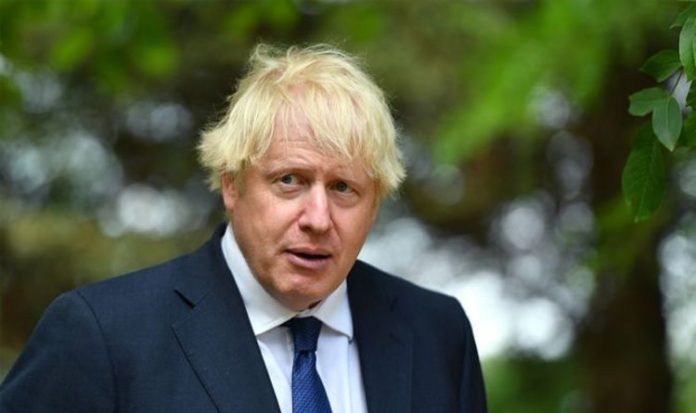This has led to a bleak warning to Prime Minister Boris Johnson that he could face a Brexiteer revolt within his own party, despite so many of his MPs voting in favour of his deal in January. Many of these figures hit out at Theresa May’s version of the deal, but ultimately backed Mr Johnson’s modified agreement with the EU as it ditched the “backstop” proposal. Under the deal, the UK and the EU are “underlining their firm commitment to no customs and regulatory checks or controls and related physical infrastructure at the border between Ireland and Northern Ireland”.
They also share the aim of “avoiding controls at the ports and airports of Northern Ireland”.
Although, this deal wasn’t welcomed by the DUP, with Arlene Foster branding it a “betrayal”.
The UK left the EU with a revised deal on January 31, 2020.
And now, some Conservative Party figures are blaming the agreement for the current deadlock.
Iain Duncan Smith raised his concerns last month.
He said: “Whilst the UK wants to have a good trade relationship with the EU as a sovereign state, the EU has different ideas.
“They want our money and they want to stop us being a competitor. The withdrawal agreement we signed last year sadly helps them.
“To avoid their own budget black hole, the EU gets £39billion as a ‘divorce payment’ from us, reflecting our share of the current EU budget.
“But it gets worse. Buried in the fine print, unnoticed by many, is the fact we remain hooked into the EU’s loan book.”
Brexiteer Andrew Bridgen also rued the UK’s withdrawal agreement in an interview with Express.co.uk.
He also launched an attack on Theresa May, blaming the former Prime Minister for the UK’s current situation.
READ MORE: Brexit: UK fishermen ‘will feel betrayed’ as ‘EU to access waters’
So much so, that he left the Brexit Party and joined the Conservatives in order to endorse it.
Calls to open up the withdrawal agreement have been shunned by the EU as trade talks continue.
In response to Iain Duncan Smith’s claims last month, a European Commission spokesperson said: “I think it’s very clear that we are not going to get into a debate with British politicians on liabilities or any other of the provisions of the withdrawal agreement.
“The withdrawal agreement is there, it is now a firm document that has been accepted by both parties and it is the basis on which both sides are acting.
“In this document it is clear that the United Kingdom has taken a certain number of completely normal legal commitments when it comes to its share of liabilities related to loans that would have been given by the EIB whilst the UK was still a member of the European Union.
“What we can say is that the withdrawal agreement stands, that in it the United Kingdom has taken a certain number of perfectly reasonable commitments related to the time when it was still a member of the European Union relating to its share of liabilities on loans given out by the EIB, and we have nothing further to comment on this.”







